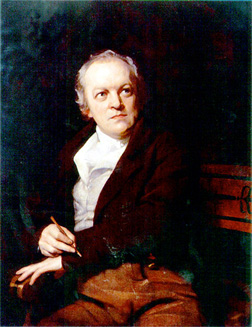A Perfect Discomfit
William Blake's two poems called "The Chimney Sweeper" create art by keeping us uncomfortable.
Here is a pair of poems more familiar than many I've presented here in the monthly "Classic Poem" feature—familiar, maybe, yet with an unsettling quality that seems inexhaustible. As in much of William Blake's writing, what I may think I know, he manages to make me wonder if I really do know.
"Blake's poetry has the unpleasantness of great poetry," says T.S. Eliot (who has a way of parodying himself even while making wise observations). The truth in Eliot's remark, for me, has to do not simply with Blake's indictment of conventional churches, governments, artists but with his general, metaphysical defiance toward customary ways of understanding the universe.
The "unpleasantness of great poetry," as exemplified by Blake, is rooted in a seductively beautiful process of unbalancing and disrupting. Great poetry gives us elaborately attractive constructions of architecture or music or landscape—while preventing us from settling comfortably into this new and engaging structure, cadence, or terrain. In his Songs of Innocence and Experience, Shewing the Two Contrary States of the Human Soul, Blake achieves a binary, deceptively simple version of that splendid "unpleasantness."
In particular, the two poems both titled "The Chimney Sweeper" offer eloquent examples of Blake's unsettling art. (One "Chimney Sweeper" poem comes from the Songs of Innocence; the other, from the Songs of Experience.) I can think to myself that the poem in Songs of Innocence is more powerful than the one in Songs of Experience, because the Innocence characters—both the "I" who speaks and "little Tom Dacre"—provide, in their heartbreaking extremes of acceptance, the more devastating indictment of social and economic arrangements that sell and buy children, sending them to do crippling, fatal labor.
By that light, the Experience poem entitled "The Chimney Sweeper," explicit and accusatory, can seem a lesser work of art. The Innocence poem is implicit and ironic. Its delusional or deceptive Angel with a bright key exposes religion as exploiting the credulous children, rather than protecting them or rescuing them. The profoundly, utterly "innocent" speaker provides a subversive drama.
But that judgment is unsettled by second thoughts: Does the irony of the Innocence poem affect me all the more—does it penetrate without seeming heavy?—precisely because I am aware of the Experience poem? Do the explicit lines "They clothed me in the clothes of death,/ And taught me to sing the notes of woe" re-enforce the Innocence poem's meanings—while pointedly differing from, maybe even criticizing, that counterpart-poem's ironic method? And doesn't that, too, bring another, significant note of dramatic outrage?
Or, to put it the question more in terms of subject matter, both poems dramatize the way religion, government, and custom collaborate in social arrangements that impose cruel treatment on some people while enhancing the lives of others (for example, by cleaning their chimneys). Does the naked, declarative quality of the Experience poem sharpen my understanding of the Innocence poem? Does the pairing hold back or forbid my understanding's tendency to become self-congratulatory or pleasantly resolved? It is in the nature of William Blake's genius to make such questions not just literary but moral.
"The Chimney Sweeper," from Songs of Innocence
When my mother died I was very young,
And my father sold me while yet my tongue
Could scarcely cry " 'weep! 'weep! 'weep! 'weep!' "
So your chimneys I sweep & in soot I sleep.
There's little Tom Dacre, who cried when his head
That curled like a lamb's back, was shaved: so I said,
"Hush, Tom! never mind it, for when your head's bare
You know that the soot cannot spoil your white hair."
And so he was quiet, & that very night,
As Tom was a-sleeping he had such a sight!
That thousands of sweepers, Dick, Joe, Ned & Jack,
Were all of them locked up in coffins of black.
And by came an Angel who had a bright key,
And he opened the coffins & set them all free;
Then down a green plain, leaping, laughing, they run,
And wash in a river and shine in the Sun.
Then naked & white, all their bags left behind,
They rise upon clouds and sport in the wind.
And the Angel told Tom, if he'd be a good boy,
He'd have God for his father & never want joy.
And so Tom awoke; and we rose in the dark,
And got with our bags & our brushes to work.
Though the morning was cold, Tom was happy & warm;
So if all do their duty, they need not fear harm.
.............................................—William Blake
Click the arrow on the audio player below to hear Robert Pinsky read "The Chimney Sweeper," from Songs of Innocence. You can also download the recording or subscribe to Slate's Poetry Podcast on iTunes.
"The Chimney Sweeper," from Songs of Experience
A little black thing among the snow,
Crying " 'weep! 'weep!" in notes of woe!
"Where are thy father and mother? say?"—
"They are both gone up to the church to pray.
"Because I was happy upon the heath,
And smiled among the winter's snow,
They clothed me in the clothes of death,
And taught me to sing the notes of woe.
"And because I am happy and dance and sing,
They think they have done me no injury,
And are gone to praise God and his Priest and King,
Who make up a heaven of our misery."
.............................................—William Blake
Click the arrow on the audio player below to hear Robert Pinsky read "The Chimney Sweeper," from Songs of Experience. You can also download the recording or subscribe to Slate's Poetry Podcast on iTunes.
Slate Poetry Editor Robert Pinsky will be joining in discussion of Blake's two "Chimney Sweeper" poems this week. Post your questions and comments on the work, and he'll respond and participate. You can also browse "Fray" discussions of previous classic poems.
Like Slate on Facebook. Follow us on Twitter.
